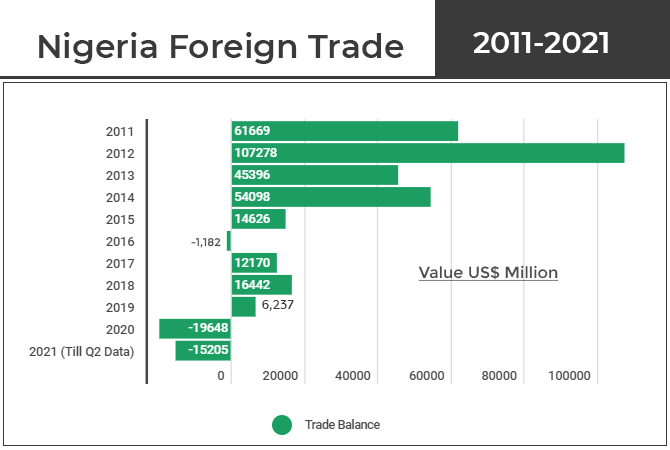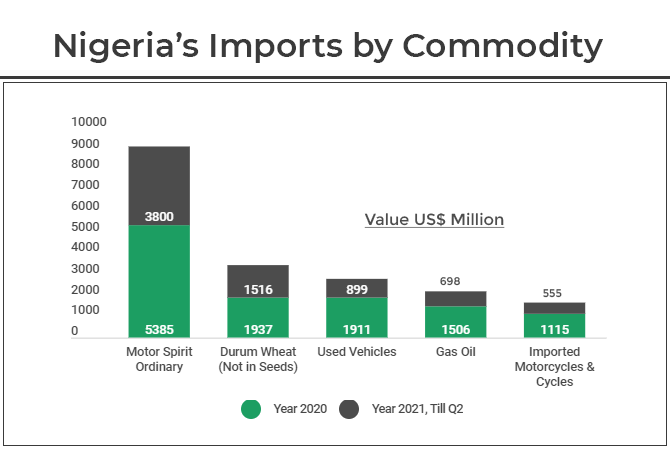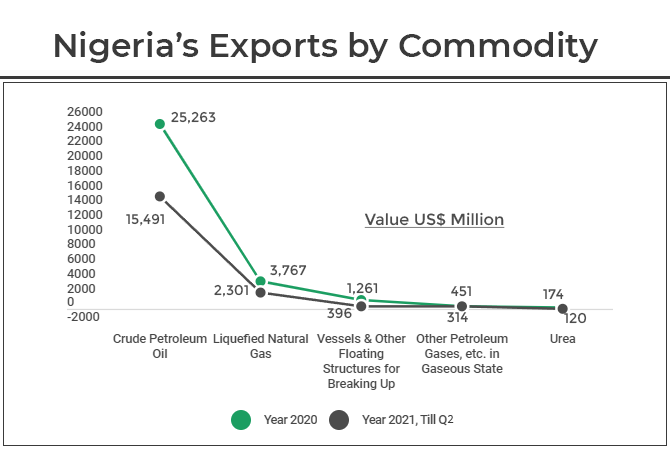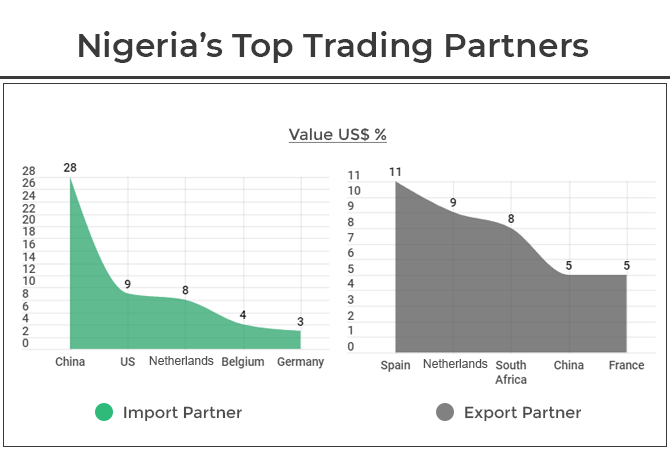Nigeria’s Trade Deficit Widens as Exports Falling & Imports Rising
28 March 2022

Nigeria’s trade deficit is expected to get widened in
2022 as the performance of the country’s export sector has been on a downward
slope. According to our database, Nigeria reported a trade deficit of US$
-19,648 million in 2020 and US$ -15,205 million in the first half of 2021. The
rising trade gap between Nigeria’s imports and exports would impact its
economy, which is the largest in the African continent. Let’s have a look at
Nigeria’s imports and exports in past years and top-most traded commodities.
Nigeria’s trade balance by year
Nigeria’s trade balance has remained relatively
healthy until 2019. The imports of the country were increased, while exports
fell sharply in 2020. In the last 10 years, exports of Nigeria saw a growth
till 2014, declined thereafter. From 2018, the value of shipments departing
from Nigeria rose and decreased in 2020. And the imports of Nigeria started
showing a rising trend from 2018. Till Q2 of 2021, Nigeria’s imports are higher
than its exports. Analyze a detailed picture of Nigeria’s trade balance from
2011 to 2021 from data visualization.

|
Year |
Trade Balance (Value US$
Million) |
Exports (Value US$
Million) |
Imports (Value US$
Million) |
|
2011 |
61,669 |
125,641 |
63,971 |
|
2012 |
107,278 |
143,151 |
35,872 |
|
2013 |
45,396 |
89,450 |
44,054 |
|
2014 |
54,098 |
98,773 |
44,675 |
|
2015 |
14,626 |
48,465 |
33,839 |
|
2016 |
-1,182 |
34,764 |
35,947 |
|
2017 |
12,170 |
41,010 |
28,839 |
|
2018 |
16,442 |
52,920 |
36,477 |
|
2019 |
6,237 |
53,624 |
47,387 |
|
2020 |
-19,648 |
33,361 |
53,010 |
|
2021 (Till Q2 Data) |
-15,205 |
20,625 |
35,830 |
Nigeria’s trade by import commodity
Nigeria’s top import commodities are motor spirit, durum wheat, used vehicles, gas oil, and imported motorcycles & cycles. Below given chart shows the dollar amount of these products recorded in 2020 and 2021 (till Q2).

|
Import Commodity |
Value US$ Million (Year
2020) |
Value US$ Million (Year
2021, Till Q2) |
|
Motor Spirit Ordinary |
5,385 |
3,800 |
|
Durum Wheat (Not in Seeds) |
1,937 |
1,516 |
|
Used Vehicles |
1,911 |
899 |
|
Gas Oil |
1,506 |
698 |
|
Imported Motorcycles & Cycles |
1,115 |
555 |
Nigeria’s trade by export commodity
Nigeria’s major export commodities are crude petroleum oil, liquefied natural gas, vessels & other gloating structures for breaking up, petroleum gases in the gaseous state, and urea. Below given chart shows the dollar amount of these products recorded in 2020 and 2021 (till Q2).

|
Export Commodity |
Value US$ Million (Year
2020) |
Value US$ Million (Year
2021, Till Q2) |
|
Crude Petroleum Oil |
25,263 |
15,491 |
|
Liquefied Natural Gas |
3,767 |
2,301 |
|
Vessels & Other Floating Structures for
Breaking Up |
1,261 |
396 |
|
Other Petroleum Gases, etc. in Gaseous State |
451 |
314 |
|
Urea |
174 |
120 |
Nigeria’s Top Trading Partners
China is Nigeria’s top trading partner, accounts about 28% in imports and 5% in exports. Other major import sources of goods are the United States, Netherlands, Belgium, and Germany, while main export destinations are Spain, Netherlands, South Africa, and France. Check average trade percentages of these countries.

|
Import Partner |
Value US$ % |
Export Partner |
Value US$ % |
|
China |
28 |
Spain |
11 |
|
United States |
9 |
Netherlands |
9 |
|
Netherlands |
8 |
South Africa |
8 |
|
Belgium |
4 |
China |
5 |
|
Germany |
3 |
France |
5 |
Russia-Ukraine War – Implications
for Nigeria’s Food Importation
Russia’s invasion of Ukraine could affect food
supplies to Nigeria and other African countries. Nigeria is Russia’s
fourth-largest export partner of wheat, accounting for about 4% of total
Russian wheat exports. Wheat is a major ingredient of Nigeria, used for the
production of a wide range of food including bread, noodles, pasta, cakes, and
many more. Russia and Ukraine put together are responsible for about 14% of
global wheat production and control about 29% of all wheat exports.
Other than wheat, Nigeria also imports sunflower
seeds, milk, and maize from Russia and Ukraine. Nigeria also imports different
types of seafood such as herrings, mackerel, and blue whiting from Russia. As the
war between Russia and Ukraine seems not to end sooner, its impact on food
supplies to Nigeria and other African countries could be huge.
Nigeria ranks 2nd in exports of Africa, and
3rd in imports. The widening of the gap between Nigeria’s exports
and imports (trade deficit) would certainly impact the country’s economy. Global
inflation and shortage of food due to Russia’s invasion of Ukraine are major
reasons behind the implication of Nigeria’s economy.









